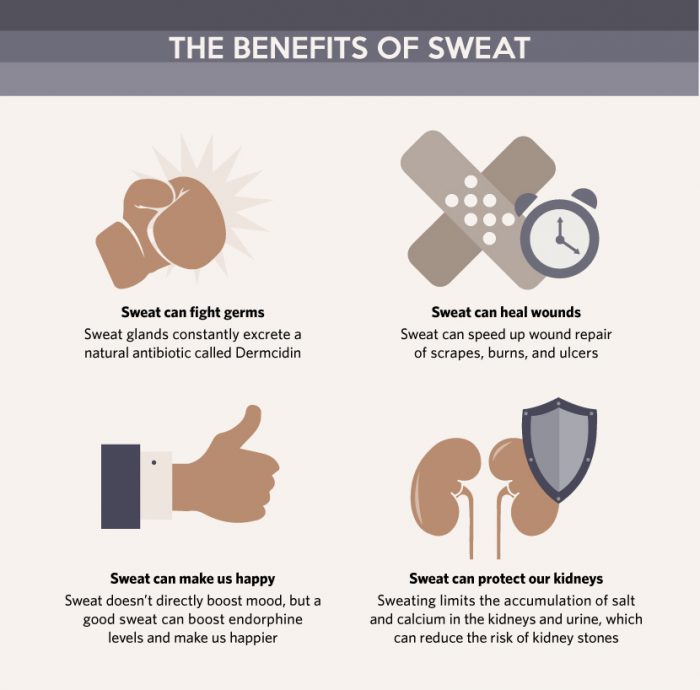Your Childhood Might Be the Reason You’re So…Sweaty
I’m kind of a sweaty person. Not, like, armpit-and-under-boob-stain sweaty. It’s not so much that I sweat buckets, it’s that I seem to start perspiring out of nowhere. It doesn’t take very much for beads of sweat to start rolling down my face, even when it’s not hot outside. Keeping makeup on my face, in general, is a challenge. In the summer, I rarely bother to try.
Why do we sweat, and why do some of us sweat more (or more often) than others? Dr. Laure Rittié, a researcher in dermatology at the University of Michigan Health System, recently explained some of the mechanics and reasons behind sweating to CNN.
I’m not crazy. I do, indeed, start sweating before I even get hot.
The whole point of sweating is to keep the body’s internal temperature regulated. Even subtle changes in temperature can make you break out in a sweat. Rittié explained:
“We sweat before we feel uncomfortably hot, and at lesser rates (instead of all of a sudden and profusely).”
So when you start feeling clammy before you become noticeably hot, that’s perfectly normal.
If you’re a particularly sweaty person, you can blame it on your childhood.
Good. It annoys me when I’m constantly dabbing at my forehead with a tissue while my friends are wrapped up in blankets, or asking me if I need a glass of water. Now I have somewhere to place the blame: on my youth.
According to Rittié, researchers think some people sweat more than others for this reason:
“Everyone is born with virtually the same number of sweat glands, but sweat glands mature during the first 2 years of life. Not all sweat glands become able to produce sweat (it depends on the need during that time).
“So people who grew up in warm climates tend to have more active sweat glands than people who grew up in a climate-controlled environment or in cold climates. As adults, we keep all our sweat glands but only a portion of them are able to produce sweat. This percentage varies between individuals.”
A-ha! This explains…nothing for me. I was born and raised in Pennsylvania by an asthmatic mother who kept the thermostat at “ice cube” year-round.
Rittié said genetics don’t seem to have anything to do with why some people are sweatier than others. It’s all about the environment you grew up in. Some parts of the developed world are so carefully and obsessively climate-controlled that many adults grew up in environments where their indoor “climate” had barely any connection to the part of the world they were from.
So if you grew up in a blistering-hot area of Africa, you’re likely to be “sweatier” than someone who grew up in the American Southwest, where you could turn on the A/C and pop open a cold one.
Your sweat glands help wounds heal
Rittié’s research has shown that:
“eccrine sweat glands, which are located throughout the body, are important for wound closure. They are major contributors of new cells that replace the cells that were lost due to injury.”
In other words, the sweat glands that don’t get “switched on” during childhood still have a vital purpose.
Sweating provides a lot of other health benefits, too. Sweating has been shown to fight off infection and illness. According to researchers in Europe, a protein found on the skin is activated when people sweat. This protein, dermcidin, kills harmful microbes and can even fight antimicrobial-resistant ones. Dermcidin is essentially an antibiotic naturally generated by the body.
Additionally, sweating helps detox the body of harmful toxins, including arsenic, lead, mercury, and cadmium.

But Rittié and her colleagues recently discovered that the wound-fixing function degrades as people age. As you get older, the number of sweat glands that promote healing decrease.
You can sweat less by laying off the air-conditioning
As I write this, I have the A/C on high, a box fan pointed at me, and the ceiling fan whirring at warp speed. (It was in the 90s yesterday, OK?)
But if I want to sweat less, Rittié says I need to warm things up a bit.
She explained:
“If you’re exposed to 85 degrees often, the body will respond by starting sweating at maybe 82 instead (please note that in fact the body responds to internal temperatures, not external).
“This is why 65 degrees in the spring usually feels warm while 65 degrees in the fall feels chilly. Why? The body is trained at the end of the summer but not in the spring.”
Rittié said that laying off the A/C a bit “would be a part of sweat-gland training to achieve more regular and controlled sweating.”
To sweat less, try cold water instead of an ice pack
Since sweating is a response to your internal temperature, not your external one, holding an ice pack to your forehead or some other part of your body “would cool you off somewhat by cooling down the blood that circulates in the skin that is in contact with the cold pack,” said Rittié.
Sure, an ice pack provides a sense of relief, but it only covers a small space. Drinking cold water works much better, because you get a lot more internal cooling that way.
Rittié suggested:
“Visualize cooling down the content of your stomach and thereby cooling down internal organs.”
I wish I had a backyard swimming pool, so I could lounge in it all day, drinking cold beverages and visualizing myself in Cancun.
Image Source:
